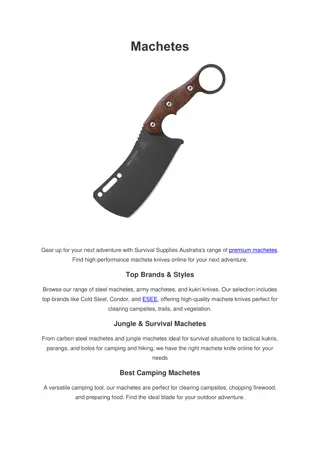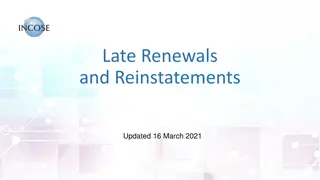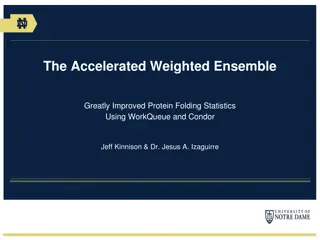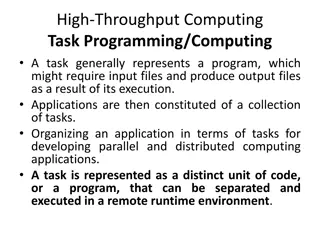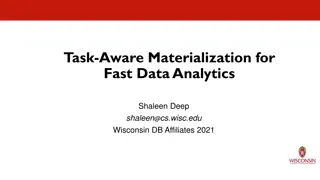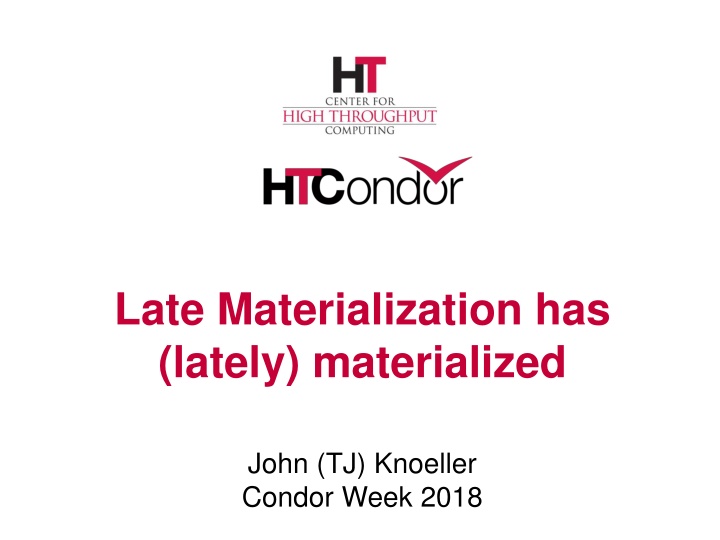
Just-in-Time Materialization for Efficient Job Scheduling in Condor
Explore the concept of just-in-time materialization for job scheduling in Condor, its evolution from late materialization, the benefits, limitations, and why it's useful in version 8.7. Learn how it impacts job queues, negotiation, and clustering for efficient resource management.
Download Presentation

Please find below an Image/Link to download the presentation.
The content on the website is provided AS IS for your information and personal use only. It may not be sold, licensed, or shared on other websites without obtaining consent from the author. If you encounter any issues during the download, it is possible that the publisher has removed the file from their server.
You are allowed to download the files provided on this website for personal or commercial use, subject to the condition that they are used lawfully. All files are the property of their respective owners.
The content on the website is provided AS IS for your information and personal use only. It may not be sold, licensed, or shared on other websites without obtaining consent from the author.
E N D
Presentation Transcript
Late Materialization has (lately) materialized John (TJ) Knoeller Condor Week 2018
How long can this go on? How long would this take to submit? executable = /bin/echo args = Hello World queue 10*1000*1000 ............................................. ............................................. ............................................. ............................................. ............................................. ............................................. ............................. 2
We want this to work Our solution is "Late Materialization" just-in-time creation of job ClassAds in the Schedd 3
First shown in 8.5 (2017) Lots of limitations Worked only with Queue <N> No real error checking Not actually included in a release It worked! As jobs finished, new jobs materialized Showed where we were going... 4
Is useful in 8.7 (2018) Works with all submit Queue options Survives restart of the Schedd Respects Schedd limits Max jobs per owner Can replace dagman submit throttling Keep a fixed number of jobs materialized Keep a fixed number of idle jobs actually non-running jobs (like Dagman) 5
Why just-in-time? Number of jobs in the queue impacts Building the "priority list" for negotiation Recalculation of autoclusters for negotiation condor_q/hold/qedit/etc Usually scan all materialized job ads (number of running jobs matters more, but...) 6
You can throttle with Dagman Comparatively expensive way to do it Hides job pressure from the Schedd (And from Glide-in factories and Annexes) 7
Enough about why, lets talk how But first, I have to explain some things... 8
What the job "queue" looks like Not a queue, order is random Schedd operates on Job ads Cluster ad has common attrs (Introduced to save memory) Job ad is overlay of Cluster ad All changes go into job ad Cluster ad is invisible to clients Cluster Cluster Cluster Jobs 9
What submit actually does (send mostly identical jobs) Make job <Cluster>.0 send 80ish attributes as <Cluster>.-1 send 2 attributes as <Cluster>.0 for proc = 1 to <N> ask permission to add a proc to the cluster send 2 attributes as <Cluster>.<proc> plus any attributes that differ from <Cluster>.-1 print a dot 10
What the job queue will look like Submit Digest Cluster holds Submit Digest used to materialize jobs Jobs created as needed Changes might go into cluster ad condor_q/hold/etc may operate on the cluster ad Cluster Submit Digest Cluster Submit Digest Cluster Jobs 11
What late materialization does (Send recipe for making jobs) Make cluster ad from job <Cluster>.0 send 80ish attributes as <Cluster>.-1 Teach Schedd to make the job ads Capture and send submit itemdata "Digest" and send submit file Schedd saves these to the $(SPOOL) directory 12
Submit itemdata If your submit file uses Queue in (a, b, c) Queue from <file> Queue from <script> Queue matching *.dat Items are sent to the Schedd as lines Written to a file in $(SPOOL) Filename is returned 13
Submit Digest Submit file simplified and frozen $ENV()expanded if and include are processed last keyword wins QUEUE items are loaded and counted QUEUE statement simplified to one of Queue <N> Queue <N> from <items-file> even more "digesting" in the future 14
How do I enable it? Configure SCHEDD_ALLOW_LATE_MATERIALIZE = true And submit with max_materialize = <n> or materialize_max_Idle = <n> or -factory (name subject to change) 15
Does it work from python? Coming in 8.7.9 sub = htcondor.Submit(""" executable = bin/echo materialize_max_idle = 1 """ sayings = [ {'Args':"Welcome to Wisconsin"}, {'Args':"Come and freeze in the land of cheese"} ] with schedd.transaction() as txn : sub.queue_from_iter(txn, 1, iter(sayings)) 16
What about tools? condor_q -factory [-wide] ID OWNER SUBMITTED LIMIT PRESNT RUN IDLE HOLD NEXTID MODE DIGEST 107. johnkn 5/12 14:40 100 10 4 6 0 75 Norm /var/li (Otherwise, clusters without materialized jobs are invisible) condor_hold <clusterid> Holds the jobs and pauses materialization condor_qedit <clusterid> Edits the job ads and the cluster ad 17
More work is needed Suggestions and feedback are welcome! What we are thinking about What should normal condor_q output be? Should you be able to qedit the ClusterAd? What about editing the submit digest? Append items to the itemdata file? Future work? Apply job transforms to the ClusterAd? Materialize on match? 18





